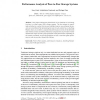Free Online Productivity Tools
i2Speak
i2Symbol
i2OCR
iTex2Img
iWeb2Print
iWeb2Shot
i2Type
iPdf2Split
iPdf2Merge
i2Bopomofo
i2Arabic
i2Style
i2Image
i2PDF
iLatex2Rtf
Sci2ools
132
click to vote
TELETRAFFIC
2007
Springer
2007
Springer
Performance Analysis of Peer-to-Peer Storage Systems
This paper evaluates the performance of two schemes for recovering lost data in a peer-to-peer (P2P) storage systems. The first scheme is centralized and relies on a server that recovers multiple losses at once, whereas the second one is distributed. By representing the state of each scheme by an absorbing Markov chain, we are able to compute their performance in terms of the delivered data lifetime and data availability. Numerical computations are provided to better illustrate the impact of each system parameter on the performance. Depending on the context considered, we provide guidelines on how to tune the system parameters in order to provide a desired data lifetime.
Related Content
| Added | 09 Jun 2010 |
| Updated | 09 Jun 2010 |
| Type | Conference |
| Year | 2007 |
| Where | TELETRAFFIC |
| Authors | Sara Alouf, Abdulhalim Dandoush, Philippe Nain |
Comments (0)

